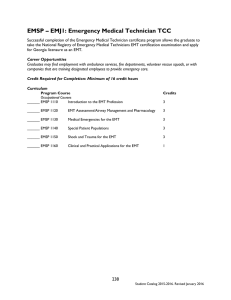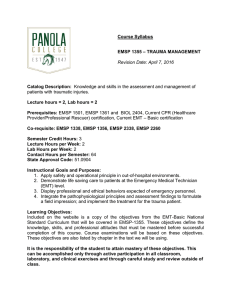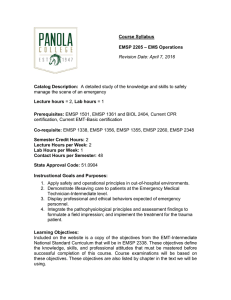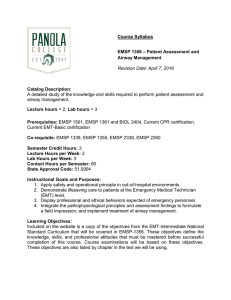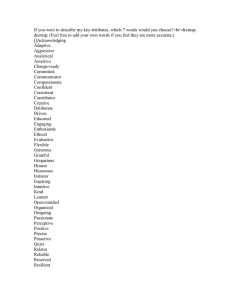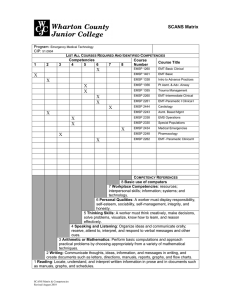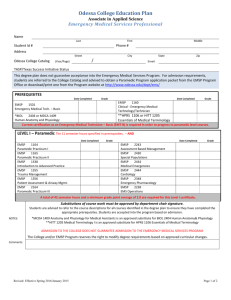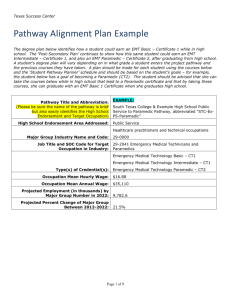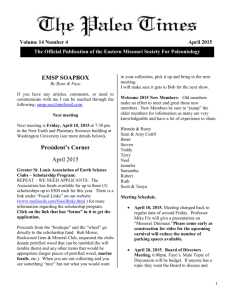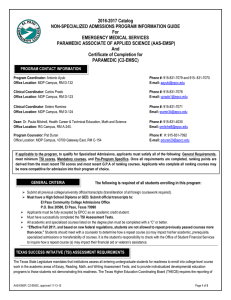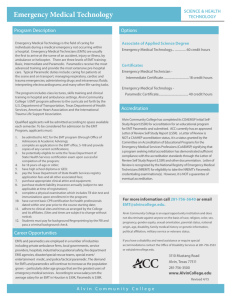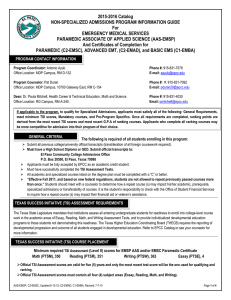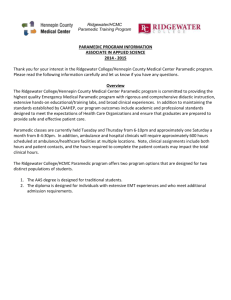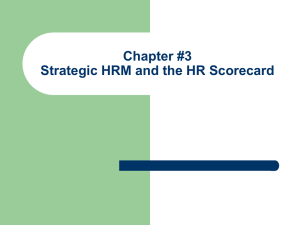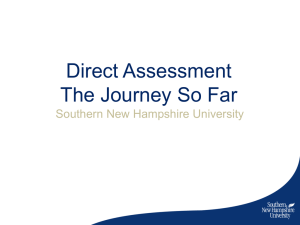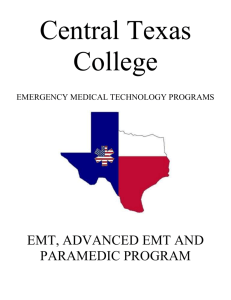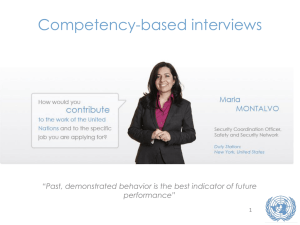College Course Outcomes
advertisement
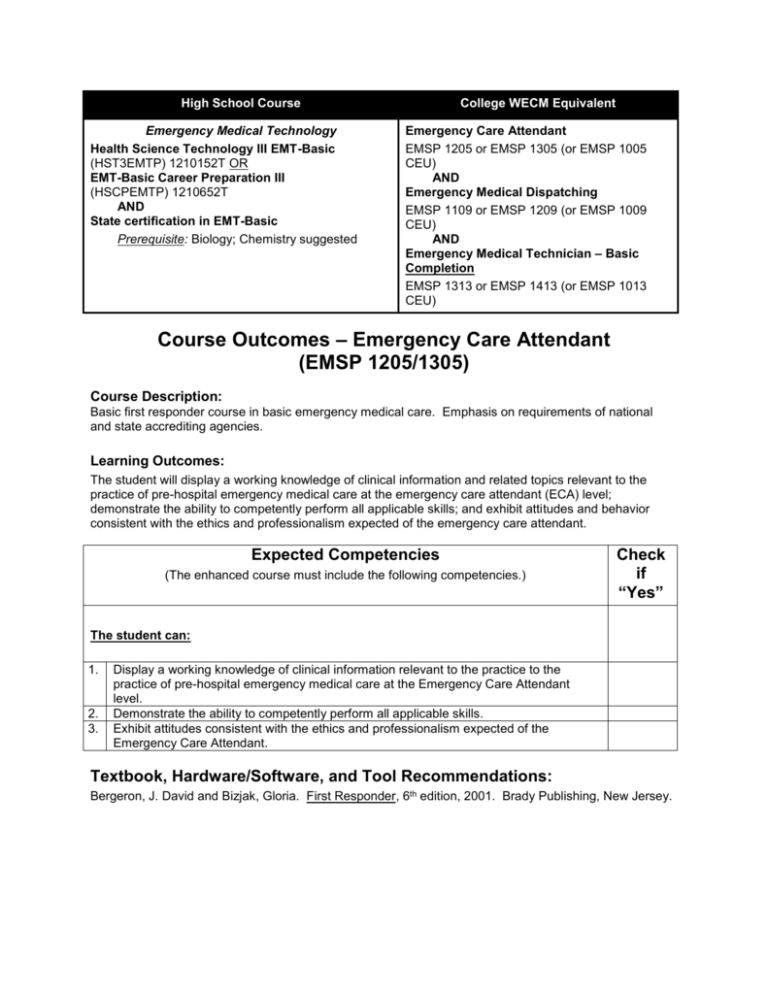
High School Course Emergency Medical Technology Health Science Technology III EMT-Basic (HST3EMTP) 1210152T OR EMT-Basic Career Preparation III (HSCPEMTP) 1210652T AND State certification in EMT-Basic Prerequisite: Biology; Chemistry suggested College WECM Equivalent Emergency Care Attendant EMSP 1205 or EMSP 1305 (or EMSP 1005 CEU) AND Emergency Medical Dispatching EMSP 1109 or EMSP 1209 (or EMSP 1009 CEU) AND Emergency Medical Technician – Basic Completion EMSP 1313 or EMSP 1413 (or EMSP 1013 CEU) Course Outcomes – Emergency Care Attendant (EMSP 1205/1305) Course Description: Basic first responder course in basic emergency medical care. Emphasis on requirements of national and state accrediting agencies. Learning Outcomes: The student will display a working knowledge of clinical information and related topics relevant to the practice of pre-hospital emergency medical care at the emergency care attendant (ECA) level; demonstrate the ability to competently perform all applicable skills; and exhibit attitudes and behavior consistent with the ethics and professionalism expected of the emergency care attendant. Expected Competencies (The enhanced course must include the following competencies.) Check if “Yes” The student can: 1. 2. 3. Display a working knowledge of clinical information relevant to the practice to the practice of pre-hospital emergency medical care at the Emergency Care Attendant level. Demonstrate the ability to competently perform all applicable skills. Exhibit attitudes consistent with the ethics and professionalism expected of the Emergency Care Attendant. Textbook, Hardware/Software, and Tool Recommendations: Bergeron, J. David and Bizjak, Gloria. First Responder, 6th edition, 2001. Brady Publishing, New Jersey. Course Outcomes – Emergency Medical Dispatching (EMSP 1109/1209) Course Description: Study of the principles and procedures used in emergency medical dispatching. Emphasis on general principles of information exchange and communication theory including various types of emergency medical service communication systems and their operating principles and procedures. Learning Outcomes: The student will display a working knowledge of the principles of emergency medical dispatching; demonstrate the ability to competently perform all applicable skills; and display attitudes and behavior consistent with the ethics and professionalism expected of the emergency medical dispatcher. Standardized competencies currently do not exist for this course. Course Outcomes – Emergency Medical Technician - Basic Completion (EMSP 1313/1413) Course Description: Continuation of the Emergency Medical Technician (EMT) - Basic course for currently certified emergency care attendants. Skill development to meet the Department of Transportation Emergency Medical Technician - Basic guidelines in all aspects of pre-hospital emergency care and hazardous material awareness. Learning Outcomes: The student will display a working knowledge of clinical information and related topics relevant to the practice of pre-hospital emergency medical care at the EMT - Basic level; demonstrate the ability to competently perform all applicable skills; and exhibit attitudes and behavior consistent with the ethics and professionalism expected of the EMT - Basic. Expected Competencies (The enhanced course must include the following competencies.) The student can: 1. 2. 3. 4. 5. Implement emergency care to clients of various age groups and diverse cultural backgrounds in a variety of emergency situations. Integrate knowledge from concepts of emergency technology, the natural, behavioral, and social sciences to access, plan, implement, and evaluate the effectiveness of emergency care for individuals and groups. Demonstrate appropriate therapeutic communication skills in verbal and written form in caring for individuals and groups through the life cycle. Collaborate with other members of the health care profession in providing emergency care to individuals and groups. Appraise the effectiveness of preventive health education measures and adaptive techniques appropriate to various experiences along the wellness-illness continuum. Check if “Yes” Expected Competencies (The enhanced course must include the following competencies.) 6. 7. 8. 9. 10. Check if “Yes” Utilize the problem-solving process in administering emergency care to clients throughout the life cycle with common acute and/or chronic health problems. A. Assess needs of individuals; B. Plan care to meet client needs; C. Evaluate outcome; D. Implement care; D. Develop probably individualized diagnosis based on client symptoms. Support the ethical values of the Emergency Medical Services Technician by being accountable and responsible for one’s own practice and actions. Assume responsibility for increasingly complex skills and self-directed learning. Accept responsibility for practicing self-evaluation, self-development, and continuing education. Participate in continuing quality improvement to ensure quality care while working with the policies of the employing institution. 11. Practice within the profession’s legal and ethical framework. 12. Support professional organizations in Emergency Medical Services Technology. 13. Identify glassware and laboratory supplies and demonstrate proper care and use. 14. Demonstrate the use of basic clinical laboratory equipment. 15. Perform a basic laboratory procedure and evaluate quality control values and patient values to determine validity of results. 16. Instruct patients in collection procedures for blood, urine, sputum and stool. 17. Outline, in the proper order, the steps utilized in specimen collections for blood and body fluids. Textbook, Hardware/Software, and Tool Recommendations: Mistovich, Joseph J., Hafen, Brent Gl, and Karren, Keith J. Prehospital Emergency Care, 6th edition. New Jersey: Brady, Prentice-Hall Health, 2000.
